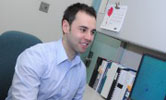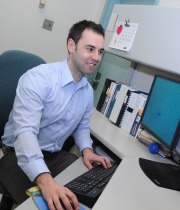
Seeing results: Don Doiron
 After completing his music degree, Don Doiron (BINF’10) decided that for him, a career in teaching music might take away some of the enjoyment he had for playing music. Doiron was born and raised in a very musical family in Miramichi, N.B. His father is a retired music teacher who brought home instruments for his children to explore and learn. As a result all three children love music and play a variety of instruments. For Doiron, studying music at a post-secondary level was a natural transition after high school. It was only after completing his music degree that Doiron started to have doubts about pursuing his initial career plans. He loved music but was not sure he wanted to make a living with music.
After completing his music degree, Don Doiron (BINF’10) decided that for him, a career in teaching music might take away some of the enjoyment he had for playing music. Doiron was born and raised in a very musical family in Miramichi, N.B. His father is a retired music teacher who brought home instruments for his children to explore and learn. As a result all three children love music and play a variety of instruments. For Doiron, studying music at a post-secondary level was a natural transition after high school. It was only after completing his music degree that Doiron started to have doubts about pursuing his initial career plans. He loved music but was not sure he wanted to make a living with music.
Pathology Informatics
Fast-forward five years, and Doiron is now part of the Pathology Informatics Team for Capital Health in a career that he describes as “awesome.” So how did he go from music to health care? “I always had an interest in computers, taking them apart, building HTML webpages and even using them with my music,” says Doiron. After moving to Halifax to pursue more education, he was attracted by a tagline for the new Bachelor of Informatics degree at Dalhousie University: Technology Bringing People Together. “Something in that line struck a cord with me,” says Doiron.
He had the good fortune to meet with Dr. Ernst Grundke, the founder of the informatics program at Dalhousie. Dr. Grundke shared Doiron’s music interest and was a very personable promoter of the program. “We had a mutual interest in music and talked about a focused major option in the program,” Doiron recalls. He continues, “then I researched the co-operative education component and the career options in health informatics and realized the incredible opportunities for graduates – I was sold!” He received advanced standing in the program and started into second year.
Doiron was a member of the first class of health informatics at Dalhousie and he says expectations were high for the students. The baseline for the program was being defined, and the students were a big part of the definition. “We did a lot of presentations and my public speaking skills really developed in those classes,” he notes. He adds, “numerous team projects provided the conditions where I found out about my individual responsibility to the group and that was invaluable to me.”
The co-op option
The co-op option proved to be very beneficial to Doiron. His first co-op placement was completed at the IWK Hospital in Halifax, creating a website and database to help manage research project results. He traveled to British Columbia and Alberta for his second and third placements.
Doiron describes co-op placements as “his practical introduction into the electronic health records field, “working directly with doctors and observing electronic records in use. He confirmed two things on work terms: there is a growing demand in the health care field for technology and data management, and he wanted to be part of it.
Doiron graduated top of his class and secured his current job with the Capital Health Department of Pathology and Laboratory Medicine’s informatics team immediately after graduation. He credits the connections he made through his senior year project with leading him into his position. Doiron was part of a senior project team that analyzed a new software application for use in the laboratory. It was a natural step to hire him.
Motivated by positive results
Capital Health has the largest laboratory department east of Quebec and is the main reference laboratory for the Maritime Provinces. Over 7 million laboratory requests and 11 million reportable results are processed by the department per year. Doiron works to support and improve the laboratory information system that records all aspects of the laboratory’s orders and results. He has worked in data and information analysis, database extracts and reporting, developing SharePoint sites and electronic dashboards that all work to directly improve patient care in Nova Scotia. For example, one dashboard provides an effective view of the outstanding STAT orders and is estimated to save two and a half hours per day over the old manual method. As time is such a factor when addressing health care issues for patients, Doiron has the satisfaction of seeing the positive influence of his work.
The newest area that is capturing his attention is mobile devices. Doiron’s team knows that speed and portability for health care providers is a must for the future. He is looking forward to being part of a group who will move the communications of vital health information into the hands of the decision maker faster and more securely. He knows it is important for the future of our health care system and he is in the right position, working with the right people and systems to make it happen. It is these and other projects that keep Doiron completely motivated in his job.
A plug for the program
Speaking about the Bachelor of Informatics program, Doiron says, “all my classmates have secured unique and rewarding jobs and the demand is there.” He went on further to say, “Dalhousie’s Bachelor of Informatics has a growing reputation in the workplace so I am a bit lost as to why more students are not enrolling in the program. Believe me, the work is here.”